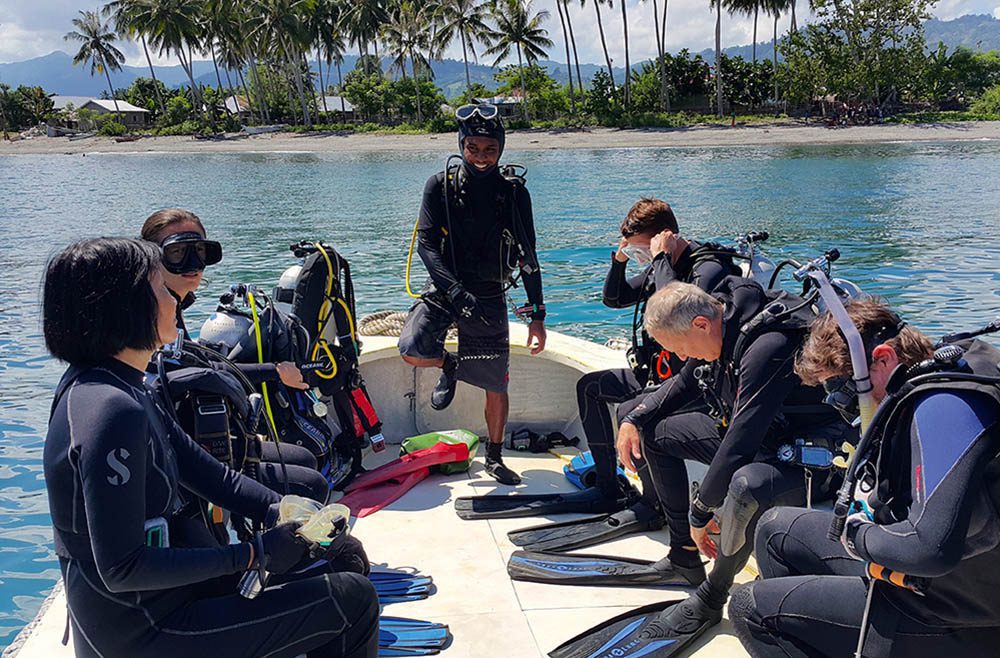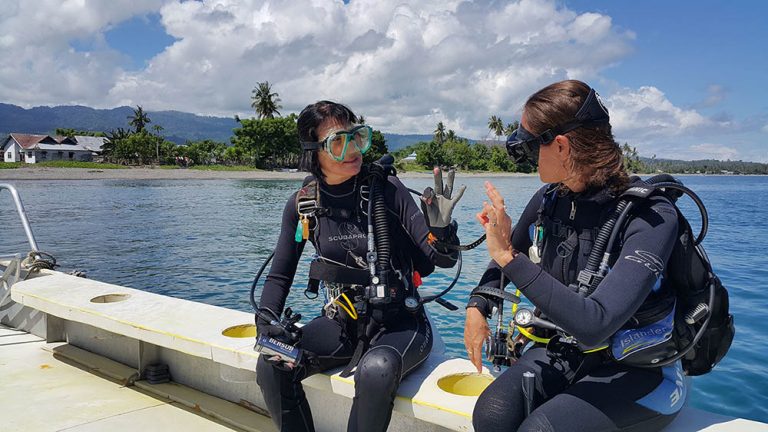It’s how we all hope other divers would describe us, but what does it take to be known as the type who can be relied upon? SIMON PRIDMORE offers his first 11 qualities
IT’S A DESCRIPTION commonly applied: “So-and-so’s a good diver!” This is something that’s usually said when the person in question is not present, and it’s something we would all like to think people say about us when we’re not around.
The politically correct response when someone says this is to nod sagely in agreement, rather than object. But what does it mean? What are the qualities that make you a good diver?
This is the first of two articles aiming to provoke discussion on a topic that is often debated when divers gather and has been debated in a number of conversations I have had over the years.
Suffice it to say, being a good diver doesn’t just come down to amassing a wallet full of cards and a garage full of cool kit.
So what are the characteristics that make for a good diver? I’m sure you have one or two in mind already, but here are a few that are on my list.
I’ll start by briefly mentioning some of the more obvious ones and then move on to others that might require a little more explanation.
- 1) 1) A GOOD DIVER …IS INDEPENDENT
- 2) 2) …HAS MASTERED BASIC SKILLS
- 3) 3) …EXCERCISES SELF-DISCIPLINE
- 4) 4)…IS METICULOUS
- 5) 5) …IS AWARE OF THE ENVIRONMENT
- 6) 6) …IS CONSIDERATE OF OTHERS
- 7) 7) …IS CONSERVATIVE
- 8) 8) …TAKES HEALTH ISSUES SERIOUSLY
- 9) 9) …DOESN’T TAKE SHORTCUTS
- 10) 10) …RESISTS PEER PRESSURE
- 11) 11) …SOMETIMES SAYS ‘NO!’
1) A GOOD DIVER …IS INDEPENDENT
There is a maxim that if you couldn’t do the dive alone, you shouldn’t be in the water. This doesn’t mean you should dive on your own, but it does mean that you should embark on every dive prepared to take care of yourself, whatever arises.
In the technical-diving world, divers are taught to perform as independent parts of a mutually supporting team.
This is the kind of approach divers really should take at all levels.
2) …HAS MASTERED BASIC SKILLS
It might seem obvious but, sadly, we live in a world in which money and enthusiasm can move a diver up the learning-ladder fast: too fast sometimes.
It’s not hard to find instructors who will turn a blind eye to the prerequisites in their training standards. Good divers recognise their true abilities and take their time mastering skills at one level before moving on to the next.
3) …EXCERCISES SELF-DISCIPLINE
Good divers adopt a disciplined approach to their diving. If there is a plan, they stick to it, and they always make sure that they have a plan.
Experienced divers might claim that they don’t need a dive-plan, but they still have one. It is just ingrained in their DNA, rather than written on a slate.
The advent of technical diving, especially rebreather diving, has further reinforced the importance of preparation and planning for successful scuba-dives.
4)…IS METICULOUS
Divers who don’t prepare adequately and regularly jump in without attaching their BC to the cylinder properly or turning their air on are unlikely to be spoken of by others in glowing terms.
Rest assured, if the above is you, you don’t have to worry about people referring to you as a good diver behind your back.
5) …IS AWARE OF THE ENVIRONMENT
Good divers are always aware of the impact they can have on the marine environment,and act to minimise the adverse effects of their presence there.
They do this by maintaining good buoyancy and control skills to ensure that they don’t come into contact with marine growth or habitats.
They also refrain from touching or interfering with marine life, ensure that they wear ocean-friendly sunscreen and produce as little waste as possible, knowing that much of the trash we produce ends up in the ocean.
6) …IS CONSIDERATE OF OTHERS

Good divers are spatially aware. They know where other divers are on the beach, in the boat, on the surface and under water and give them room. They also respect other divers, no matter how much experience they have.
7) …IS CONSERVATIVE
Good divers dive well within the limits because they know that dive-computers are limited in their ability to assess the risk of decompression illness. This is primarily because the computer just does not have access to some of the information necessary to do that – information such as the diver’s level of hydration, physical fitness and surface activity between dives.
8) …TAKES HEALTH ISSUES SERIOUSLY
The diving population in Europe and America is ageing and gaining weight. Heart attack is becoming an increasingly common cause of diver death, and the victims of fatal diving incidents are often overweight.
Although it’s true that our sport doesn’t require that participants should be fit, athletic and built like racing whippets, nevertheless a good diver stays in physiological and physical shape.
This involves following a basic fitness regime, getting regular medical check-ups and being aware enough of their limitations not to dive if they become ill, injured, incapacitated or after significant surgery.
As we do more diving, we gain in experience, but no matter how much we learn, the laws of nature still apply.
As our bodies age they become weaker, we become more susceptible to ailments and our chances of dodging a physiological bullet decrease.
When good divers don’t feel right, they don’t dive.
9) …DOESN’T TAKE SHORTCUTS
As the cliché goes, familiarity breeds contempt. Complacency in diving is often the counterbalance to experience.
The problem is that we’re human, and by our very nature we’re always looking for an easier way to do things. If you like, this is one of the primary drivers that generates progress in our species.
Fear is another primary driver, and when we start diving fear is a key motivator that makes us more careful and keeps us safe.
But the more dives we make without incident, the less we fear, the more we become convinced that the risks are smaller than we thought and the greater is the temptation to make life easier for ourselves.
We start asking ourselves questions such as: “Do we really need a spare light on a night dive when the main light has never failed?” “Why shouldn’t I do my second dive on a partially full cylinder? It’s only shallow.” I am sure you can think of many more examples.
All of us reach the point where these thoughts bubble up from the deepest reaches of our consciousness. Good divers resist them and send them back down where they came from.
10) …RESISTS PEER PRESSURE
Good divers resist other forms of pressure too. Pressure can come from a variety of sources. Some are obvious; others are not. One of the levers that can affect divers and cause them to change the way they dive is peer pressure.
Sometimes this is exerted directly, for instance when someone lays down a challenge. At other times it is merely perceived. In either case, it can be powerful enough to lead a diver to take unnecessary risks.
The history of scuba-diving includes a number of tales of divers, some of whom were prominent figures in the sport, who went beyond their comfort zone, dived beyond their limits and took unnecessary risks in order to prove something to themselves or others and ended up getting hurt or worse.
11) …SOMETIMES SAYS ‘NO!’
Everyone knows that it is not wise to dive if you’re feeling unwell or tired, but it can be hard to sit out a dive when you’re part of a group.
It’s even harder when you’re one of a group of two, and your refusal has an adverse impact on your buddy’s dive.
Good divers know that they are doing nobody any favours if they press ahead with a dive despite the fact that they don’t feel well, because a sudden medical emergency or lack of concentration through fatigue can put the safety of the whole team at risk.
Of course, good divers also do their utmost to prevent ill-health or fatigue affecting their dive plans, but sometimes such things are not easily controlled.

